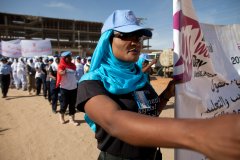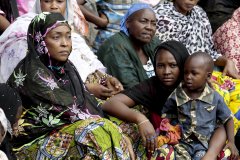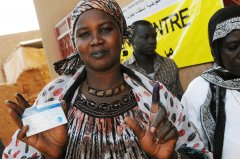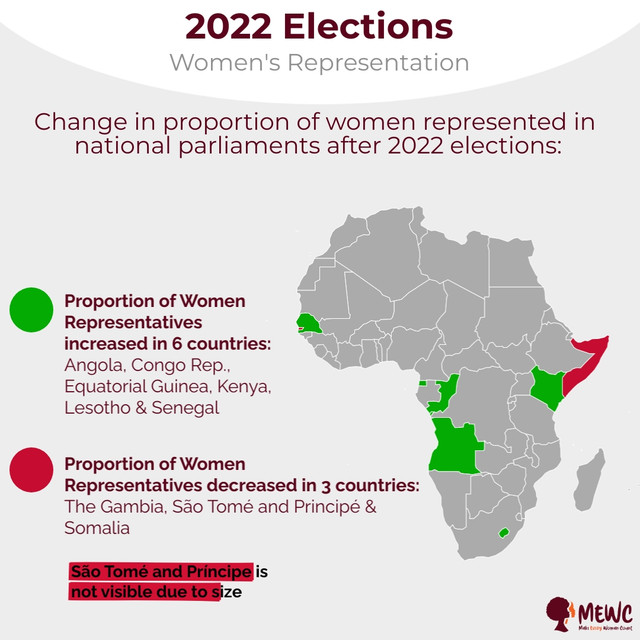Gender Issues Showlist
Women, Peace & Security
UNSCR 1325 calls on all parties to: protect and respect the rights of women and girls in conflict & post-conflict; increase women participation in all conflict resolution, peacekeeping and peace-building & to end impunity by prosecuting perpetrators of sexual and other violence on women and girls
index.php?option=com_content&view=category&id=56&Itemid=1913
Human Rights of Women
Thirty six years after the adoption of CEDAW, many women and girls still do not have equal opportunities to realize rights recognized by law. Women are denied the right to own property or inherit land. They face social exclusion, “honor killings”, FGM, trafficking, restricted mobility, early marriage,...
index.php?option=com_content&view=category&id=44&Itemid=1908
Violence Against Women
Violence against women is the most shameful human rights violation. Gender based violence not only violates human rights, but also hampers productivity, reduces human capital and undermines economic growth. It is estimated that up to 70 per cent of women experience violence in their lifetime
index.php?option=com_content&view=category&id=69&Itemid=1912
Political Participation & Leadership
Where women are fully represented, societies are more peaceful and stable. Women political participation is fundamental for gender equality and their representation in positions of leadership must be a priority for all Africans governments.
index.php?option=com_content&view=category&id=65&Itemid=1911
Latest News
- COTE D'IVOIRE: South-South Meeting to Promote Gender Equality and Combat Deforestation
- RWANDA: Rwanda Set to Launch Cervical Cancer Elimination Plan
- NIGERIA: Over 5,000 Nigerian Women Stranded in Iraq - Govt
- SUDAN: Healthcare Collapse Threatens Pregnant Women in Sudan's Sharg El Nil
- GHANA: President Nominates 12 More Ministers
- Senegal: Parliamentary election 2024
- Mauritius: Parliamentary election 2024
- Ghana: Presidential and Parliamentary Elections
- Botswana: Parliamentary elections 2024
- Algeria: Presidential Election 2024
SOMALIA: Legislative Elections-No Female Candidates
Hassan Sheikh Mohamud is Somalia's new president, according to official results from Mogadishu. Mohamud had come second to the incumbent president, Sheikh Sharif Ahmed, in the first round of voting among Somalia's parliamentarians.
But he then passed the 50 per cent threshold in the second round, winning by 190 votes to 79.
Allegations of Fraud
Senior diplomatic sources deployed in the region to ensure an honest and fair election, have confirmed that votes had been bought and sold over the past few days. It is the first time since the 1991 overthrow of president Said Barre that a new leader has been chosen inside the country, a development hailed by the UN as a sign of improving security. But the process has been tainted by allegations of bribery and corruption[i].
While widespread instability in society can lead to positive and negative shifts in gender roles, the constraints on women’s entry to politics and governance structures are often exacerbated during armed conflict. At the same time, gender equality is often not considered an urgent issue in the aftermath of war—a factor that has a lasting impact on women’s ability to engage in the transitional process and long-term reconstruction and development.
Despite political, societal, cultural, economic, and psychological barriers, women are finding ways to participate in the political life of post-conflict societies in record numbers.
Women’s Political Participation
In 2004, after 13 years of civil war, the lengthy and complex Somali peace talks facilitated by the Nairobi-based Intergovernmental Authority on Development (IGAD) began to make headway. In January, an agreement was reached to select members of Parliament based on the traditional clan system.
Women activists, leaders and civil society associations have been highly involved in the political reform project, following a conference in Nairobi in 2000, in May 2000 women leaders decided to create their own clan to lobby for women’s political participation. With the support of the NGO Save Somali Women and Children, UNIFEM, and other organizations, the 100 women tirelessly lobbied clan leaders, international representatives, and other Somali women to be recognized as a “sixth clan,” a group of women united as women and not by tribal affiliation[ii].
In a recent interview Dr. Shukria Dini, who is the founder of the Somali Women’s Studies Centre in Nairobi, Kenya, talked about how the breakdown of the Somali state has created a new space for women as actors for peace and security. However, she also pointed out that women are marginalised and that the patriarchal clan system, which is very powerful in Somalia, opposes women’s involvement in decision-making. Hence, Dr. Dini questioned the use of the clan system to promote women’s rights, saying: "Why use a system that denies women participation to promote women’s rights? It will never work.[iii]"
Monitoring the Progress?
Due to the limited availability of data it is difficult to assess women’s participation in the elections that have just taken place. In July 2003, delegates agreed to reserve 12 percent of seats for women in the National Assembly and 25 percent in regional assemblies—this remained in the final version of the Charter. A summary of women’s reaction at the time notes: “Although a 12 percent quota was not what the women delegates had hoped for, the women at the peace talks saw it as an important outcome of their participation in the talks since there could have been no reference at all to women’s participation in the documents. These gains are a starting point for longer-term advocacy efforts[iv].”
Ongoing challenges
Female literacy in Somalia is among the lowest in the world. Improving female literacy is an essential step towards addressing women’s political exclusion and their disempowerment by the various male dominated, male controlled judicial systems that operate in different parts of the country[v].
Women are still largely viewed as passive victims, not agents for change, and there is a lack of unity among different actors working for women’s empowerment. Civil Society Organisations (CSO's) and parliamentarians work in isolation from each other and there is little unity among CSO's. Hence, there is no collective agenda or policy. As a result of the lack of resources and funding, women’s rights organizations in Somalia are also competing with each other for funding[vi].
Data regarding women’s current representation will be available shortly.
[ii] UNFEM. BEYOND NUMBERS: SUPPORTING WOMEN’S POLITICAL PARTICIPATION AND PROMOTING GENDER EQUALITY IN POST-CONFLICT GOVERNANCE IN AFRICA. A REVIEW OF THE ROLE OF THE UNITED NATIONS DEVELOPMENT FUND FOR WOMEN
[iv] UNFEM. BEYOND NUMBERS: SUPPORTING WOMEN’S POLITICAL PARTICIPATION AND PROMOTING GENDER EQUALITY IN POST-CONFLICT GOVERNANCE IN AFRICA. A REVIEW OF THE ROLE OF THE UNITED NATIONS DEVELOPMENT FUND FOR WOMEN





